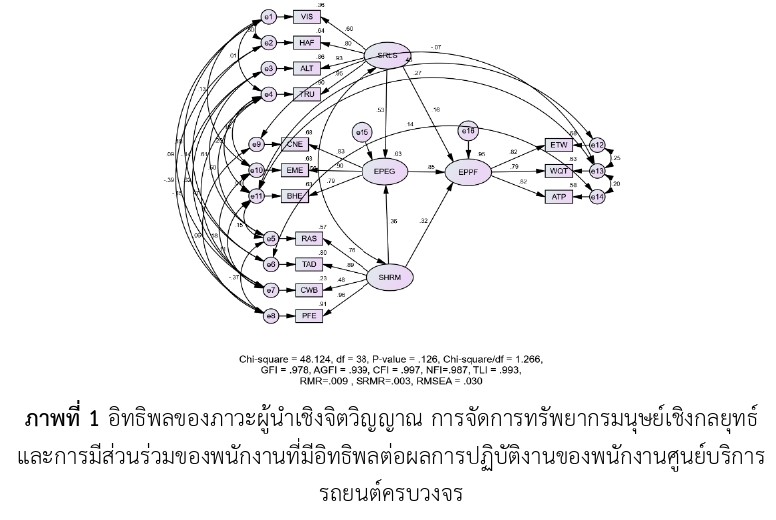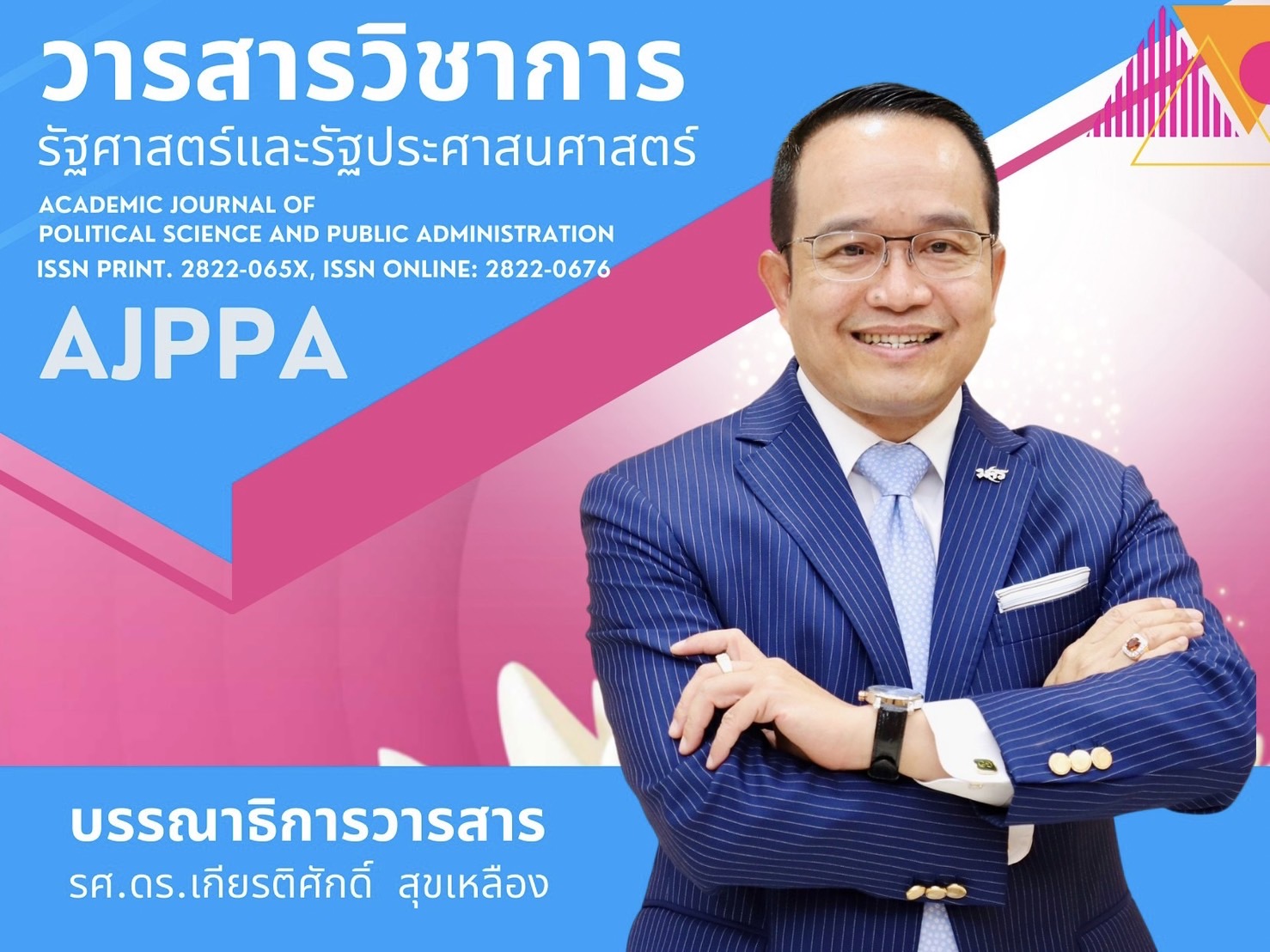อิทธิพลของภาวะผู้นำเชิงจิตวิญญาณ การจัดการทรัพยากรมนุษย์เชิงกลยุทธ์และ การมีส่วนร่วมของพนักงานที่มีผลต่อผลการปฏิบัติงานของพนักงานศูนย์บริการรถยนต์ครบวงจร
คำสำคัญ:
ภาวะผู้นำเชิงจิตวิญญาณ, การจัดการทรัพยากรมนุษย์เชิงกลยุทธ์, การมีส่วนร่วมของพนักงาน, ผลการปฏิบัติงานบทคัดย่อ
บทความวิจัยนี้มีวัตถุประสงค์เพื่อศึกษา 1. ระดับภาวะผู้นำเชิงจิตวิญญาณ การจัดการทรัพยากรมนุษย์เชิงกลยุทธ์ การมีส่วนร่วมของพนักงานและผลการปฏิบัติงานของพนักงานศูนย์บริการรถยนต์ครบวงจร 2. อิทธิพลทางตรงและทางอ้อมของภาวะผู้นำเชิงจิตวิญญาณ และการมีส่วนร่วมของพนักงานที่มีผลต่อผลการปฏิบัติงานของพนักงานศูนย์บริการรถยนต์ครบวงจร และ 3. อิทธิพลของภาวะผู้นำเชิงจิตวิญญาณ ที่มีผลต่อผลการปฏิบัติงานผ่านการมีส่วนร่วมของพนักงานศูนย์บริการรถยนต์ครบวงจร การวิจัยนี้เป็นการวิจัยเชิงปริมาณและเชิงคุณภาพ โดยการวิจัยเชิงปริมาณ กลุ่มตัวอย่างประกอบด้วยพนักงานจากศูนย์บริการรถยนต์ครบวงจร จำนวน 118 แห่ง รวมทั้งสิ้น 300 คน การกำหนดขนาดกลุ่มตัวอย่างใช้เกณฑ์ 20 เท่าของตัวแปรสังเกตได้ และใช้วิธีการสุ่มตัวอย่างแบบแบ่งชั้นภูมิของศูนย์บริการรถยนต์ครบวงจร เครื่องมือที่ใช้ในการเก็บรวบรวมข้อมูลคือแบบสอบถาม และวิเคราะห์ข้อมูลโดยใช้การวิเคราะห์สมการโครงสร้าง สำหรับการวิจัยเชิงคุณภาพ การสัมภาษณ์เชิงลึก จากผู้เชี่ยวชาญ จำนวน 9 ท่าน และวิเคราะห์ข้อมูลโดยใช้วิธีการวิเคราะห์เนื้อหา เพื่อความเข้าใจในผลการวิจัยเชิงปริมาณ
ผลการวิจัยพบว่า 1. ผลการปฏิบัติงานของพนักงานอยู่ในระดับสูงสุด รองลงมาคือการมีส่วนร่วมของพนักงานซึ่งอยู่ในระดับมาก ในขณะที่ภาวะผู้นำเชิงจิตวิญญาณ และการจัดการทรัพยากรมนุษย์เชิงกลยุทธ์อยู่ในระดับปานกลาง ค่าเฉลี่ยของตัวแปรต่าง ๆ อยู่ในระดับมาก 2. ภาวะผู้นำเชิงจิตวิญญาณ และการมีส่วนร่วมของพนักงาน ล้วนมีอิทธิพลต่อผลการปฏิบัติงานของพนักงานศูนย์บริการรถยนต์ครบวงจรอย่างมีนัยสำคัญ และ 3. การมีส่วนร่วมของพนักงานเป็นตัวแปรสื่อกลางที่ทำให้ภาวะผู้นำเชิงจิตวิญญาณส่งผลทางอ้อมเชิงบวกต่อผลการปฏิบัติงานของพนักงาน ซึ่งจะนำไปสู่การยกระดับผลการปฏิบัติงานในที่สุด
เอกสารอ้างอิง
ปภาพร มนตรีเจริญ. (2566). รูปแบบการพัฒนาทรัพยากรมนุษย์เชิงกลยุทธ์ของครูวิชาภาคพื้นกองวิชาช่างอากาศยาน สถาบันการบินพลเรือน. วารสารนิติศาสตร์ รัฐศาสตร์ และสังคมศาสตร์ มหาวิทยาลัยราชภัฎเชียงราย, 7(1), 289-312.
Cho, H. & Han, K. (2018). Associations among nursing work environment and Health-Promoting behaviors of nurses and nursing performance quality: a multilevel modeling approach. Journal of Nursing Scholarship, 50(4), 403–410.
Collins, C. J. (2021). Expanding the resource based view model of strategic human resource management. The International Journal of Human Resource Management, 32(2), 331–358.
Deeb, A., Alananzeh, O.A., Tarhini, A., & Masa’deh, R.E. (2020). Factors affecting job performance: the case of Jordanian hotels’ kitchen staff. International Journal of Public Sector Performance Management, 6(3), 340–360.
Jiang S, et al. (2021) Use YeastFab to Construct Genetic Parts and Multicomponent Pathways for Metabolic Engineering. Methods Mol Biol 2196, 167-180.
Karaman, M., Yoldaş, A., & Kılıç, B. (2020). Investigation of the Effect of Organizational Exclusion on Job Performance and Intention to Leave. Journal of Selcuk University Vocational School of Social Sciences, 23(2), 479-496.
Lo, A.S., & Wu, C. (2014). Effect of Consumption Emotion on Hotel and Resort Spa Experience. Journal of Travel & Tourism Marketing, 31(8), 958-984.
Marques, J., Dollard, M., & Bakker, A.B. (2021). Spiritual leadership and employee well-being: The mediating role of basic psychological needs satisfaction and work engagement. Journal of Business Ethics, 170(4), 713-730.
Mello, J. A. (2020). Strategic human resource management (4th ed.). Boston: Cengage Learning.
Mustafa, N. (2020). Impact of the 2019-20 Coronavirus Pandemic on Education. International Journal of Health Preferences Research, 10(7), 1-12.
Naktiyok, S. (2019). The Impact of Organizational Support on Quality of Work Life within the Scope of Psychological Empowerment. International Journal of Society Researches, 13(9), 1528-1551.
Nkansah, D., Gyimah, R., Sarpong, D., & Annan, J. (2023). The Effect of Employee Engagement on Employee Performance in Ghana’s MSMEs Sector during COVID-19: The Moderating Role of Job Resources. Open Journal of Business and Management, 11, 96-132. https://doi.org/10.4236/ojbm.2023.111007
Raub, S., Alvarez, L., & Khanna, R. (2006). The different roles of corporate and unit level human resources managers in the hospitality industry. International Journal of Contemporary Hospitality Management, 18(2), 135–144.
Saks, A. M. (2019). Antecedents and consequences of employee engagement revisited. Journal of Organizational Effectiveness, 6(1), 19–38.

ดาวน์โหลด
เผยแพร่แล้ว
รูปแบบการอ้างอิง
ฉบับ
ประเภทบทความ
หมวดหมู่
สัญญาอนุญาต
ลิขสิทธิ์ (c) 2025 วารสารวิชาการรัฐศาสตร์และรัฐประศาสนศาสตร์

อนุญาตภายใต้เงื่อนไข Creative Commons Attribution-NonCommercial-NoDerivatives 4.0 International License.




